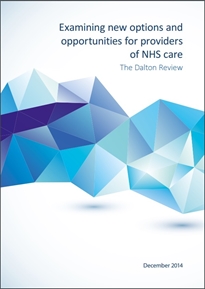23.11.15
Putting the Dalton review principles into practice
Source: NHE Nov/Dec 15
NHE hears from Sir David Dalton about radical proposals to turn groups of foundation trusts into accountable care organisations that would share service standards, governance arrangements and – eventually – take control of local commissioning.
It has been a year since the publication of the Dalton Review, and Sir David Dalton’s own organisation, Salford Royal NHS FT, is helping turn its ideas of ‘multi-service chains’ into reality via its foundation group with neighbouring Wrightington, Wigan & Leigh NHS FT.
The two foundation trusts’ joint plan was given vanguard status by NHS England under the ‘acute collaboration’ banner.
At its heart is a commitment to what Dalton calls “standardisation at scale” – the idea that a foundation group can deliver operational excellence by providing integrated care on a locality basis, supported by single-shared clinical services for acute care across hospitals, serving a larger geographic population. But its long-term aims are radical, and would see foundation groups take control of local commissioning, population health and asset management.
 Sir David told NHE: “We hope this will act as a blueprint for the NHS moving forward.
Sir David told NHE: “We hope this will act as a blueprint for the NHS moving forward.
“Working together, we are going to explore how we can create a group to further improve our services to patients. We want to use our joint experiences as two high-performing trusts to look at developing shared decision-making, shared standards and, where appropriate, shared services. By doing this, we believe we can reduce variation in patient outcomes and enable our trusts to increase their productivity.
“We are at the start of a very exciting venture and the gaining of vanguard status, and associated funding and support, provides us with a great platform for us to start developing our ideas at pace and scale.
“Staff at both trusts, along with other stakeholders, including patient representative groups, will have an important role to play in working together to consider the opportunities for transforming our services and improving outcomes for the populations we serve.”
Intolerable variation in standards and outcomes
In September, Dalton and his counterpart from Wrightington, Wigan & Leigh, Rob Forster, addressed the NHS England vanguard selection event, where they dived more deeply into the thinking behind their collaboration and how it ties into the principles of the Five Year Forward View. Dalton asked the panel and the audience: “Why do we tolerate the extent of variation in our service standards and patient outcomes and efficiency between our organisations across the country?
“If we know the evidence of best practice, then surely we, you, should be capable of defining the service standards and organising reliable delivery against those standards. Now, we have NICE guidelines, and I know all trusts here today will be producing their own trust policies and submitting those into their organisation. But I put to you that I, and you, actually have no idea if the people in your organisation are actually adhering to those standards.
“The consequence is, patients suffer from sub-optimal treatment. Some will die. And we will continue to preside over inefficient and unproductive organisations. It’s our contention that reliability can be assured through standardisation. And with an engaged and motivated workforce, we can use evidence-based care pathways and our electronic healthcare system to support clinicians’ decision-making, to enable them to develop standardised care pathways that will support them to determine and advise on the tests and treatment required, and the algorithms for prescribing.
“This system can also ensure just-in-time ordering of consumables for the length of stay of our patients. And, most importantly, it can determine – in real time – the skills and staffing needs based upon the assessed dependency of every patient, every hour.”
Taking the lead
Forster said the two trusts, which employ more than 11,000 staff and serve a population of 650,000 people, have a successful history of collaboration (they also share a pathology service) and that this closer integration is the next step, and one which should be nationally replicable.
The work is also happening alongside both the Healthier Together reorganisation of acute and specialist services in the conurbation, and the devolution agenda that is handing more power over place-based spending and decision-making on health and social care to the city-region’s local authorities, CCGs and providers (more on page 42).
Sir David told NHE that the acute collaboration vanguard was a “fantastic opportunity to take a lead on the development of a new and innovative approach to delivering high-quality care”.
He added: “We believe this can be achieved through standardisation and supporting staff to deliver the right care, at the right time and in the right place.”

Taking 1,000 beds out of six hospitals and developing close-to-home alternatives
An early priority for the two trusts – already being referred to as ‘accountable care organisations’ by Dalton, using a US term that is gaining increasing cachet in the NHS – will be a 20% improvement in efficiency, and a 20% reduction in acute beds.
Dalton said that would be achieved by developing at-home or close-to-home alternatives, and added: “We believe it is possible to reduce acute beds by about 20%, which would take out about 1,000 beds across a group of six hospitals. Taking these assets off the group’s balance sheets will be one of the speediest ways of liberating cash within the system.”
The two FTs are working with counterparts in Northumbria and the Royal Free in London to spread learning and investigate the fastest replication methods.
Having so many providers ‘no longer affordable or sensible’

Dalton told the vanguard selection panel in September in no uncertain terms that there are too many provider trusts: “It’s my belief that having 240 organisations in our National Health Service, or 15 organisations in Greater Manchester, is no longer an affordable or sensible way of delivering reliable care at lower cost.”
But he has also been clear that this latest initiative is not the first step towards a merger, and that both organisations will retain their independence. Salford Royal is one of just three English hospitals rated ‘outstanding’ by the CQC, and the only one outside the south east, while Dalton’s and Forster’s trusts “share similar cultural styles, based upon our approach to patient and carer engagement, our values, leadership, and deep clinical staff involvement and deference to their expertise”, they say.
But their partnership will not stop there, they hope – Dalton told the vanguard selection panel: “We envisage our Group, starting with the two of us, to operate in the north west of England and have population coverage of up to two million. Over time, we see this group cluster likely to include between five and eight organisations.
“Now, let me be clear – a group is not a traditional merger or acquisition. Foundation trusts would continue to belong to a group, retaining their public membership, but ceding some sovereignty to a group board, and that board determines the standard operating systems and assures that they are reliably used.”
“We envisage that ‘GroupCo’ would also take responsibility for investment, asset management and strategic service changes, supporting the development of care models, harmonising our care models both vertically in our locality and horizontally across trusts in the group. GroupCo would consolidate both back-office functions and clinical support services, and would organise the delivery of all of the Carter review recommendations.”
Taking responsibility for commissioning
Turning to commissioning and strategic vision, Dalton explained: “We want to work with NHS England to develop population health management systems, and over time see the transfer of responsibility of current commissioning arrangements to each accountable care organisation.”
Dalton concluded: “The project is radical. It is a new approach to reduce variation in patient outcomes, and to deliver reliability at scale through the standardisation of clinical pathways. And, in coalition with industry partners, we will pursue value-based leadership across all elements of our group, and we will ensure that the benefit can be delivered at scale.”
Tell us what you think – have your say below or email [email protected]